Creating a Community: Celebrating First Book Institute Alumni Award Winners

For many people, writing—whether an essay, a poem, a book, or an email—can be challenging even under ideal conditions. But writing a first scholarly monograph while simultaneously learning about and dealing with the demands of a new professional position (whether tenure track, administrative, postdoctoral, or contingent) and also working to meet the teaching and service requirements of those positions can feel overwhelming on the best of days. However, the Center for American Literary Studies’s First Book Institute, under the direction of Professors Sean X. Goudie and Priscilla Wald, has strived to make writing under those conditions feel less like a solitary enterprise and more like a vital and communal practice. Since its inception in 2013, the First Book Institute has gathered junior Americanist faculty on Penn State University’s University Park campus for one week each summer to read, write, and workshop in what participants and directors alike describe as a collegial and encouraging environment. “When we started the institute,” Goudie explains, “Priscilla and I wanted to create a space where early career scholars could go to transform their first book projects into the best work possible.” And according to Wald, it is the supportive atmosphere that matters both during the institute and in the months and years that follow: “We have found,” she reveals, “that participants often form support communities that continue past the week of the workshops….Many scholars work in places where they don’t have colleagues in their fields...and it is invaluable to have trusted interlocutors, so we are delighted to see such groups forming out of the [Institute’s] workshops each year.”
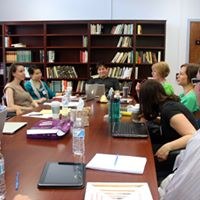
- 2014 First Book Institute participants and Sean Goudie, at the head of the table, during one of the week's opening workshops
While CALS and the First Book Institute have been proud to foster supportive writing communities—to date, past participants have produced ten monographs, with several more in press or forthcoming—2018 brought extra cause for celebration. In December, three past participants were honored with awards recognizing the impact and achievement of their books. The three award winners—Adrienne Brown, Associate Professor of English at the University of Chicago, whose The Black Skyscraper: Architecture and the Perception of Race (Johns Hopkins UP, 2017) won the Modernist Studies Association’s First Book Prize; Sonya Posmentier, Associate Professor of English at New York University, named co-winner of the MLA’s William Sanders Scarborough Prize for Cultivation and Catastrophe: The Lyric Ecology of Modern Black Literature (Johns Hopkins UP, 2017); and Carrie Hyde, Associate Professor of English at the 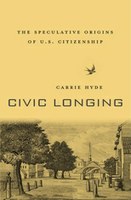 University of California, Los Angeles, recipient of the Gustave O. Arlt Award in the Humanities from the Council of Graduate Schools for Civic Longing: The Speculative Origins of U.S. Citizenship (Harvard UP, 2018)—represent three distinct academic institutions and sets of scholarly commitments, yet it’s clear from their reactions to these honors that the community that forms during each Institute was an important part of each scholar’s writing process. “The most valuable thing about the FBI,” remembers Posmentier, “was that we read each other’s work carefully and talked specifically about the ideas, histories, forms, and theories about which we were writing.” Becoming deeply informed about and by each other’s work means that each cohort forms a group of “border intellectuals,” or scholars whose work crosses disciplinary boundaries, a location that Hyde drew inspiration from when revising her project. It’s also an interdisciplinary vantage point that the Arlt Award in the Humanities citation explicitly recognized, commending Civic Longings for its “invaluable contribution to understanding the history of U.S. citizenship and its complexities” by “succeeding in reaching readers in multiple fields of humanistic thought.”
University of California, Los Angeles, recipient of the Gustave O. Arlt Award in the Humanities from the Council of Graduate Schools for Civic Longing: The Speculative Origins of U.S. Citizenship (Harvard UP, 2018)—represent three distinct academic institutions and sets of scholarly commitments, yet it’s clear from their reactions to these honors that the community that forms during each Institute was an important part of each scholar’s writing process. “The most valuable thing about the FBI,” remembers Posmentier, “was that we read each other’s work carefully and talked specifically about the ideas, histories, forms, and theories about which we were writing.” Becoming deeply informed about and by each other’s work means that each cohort forms a group of “border intellectuals,” or scholars whose work crosses disciplinary boundaries, a location that Hyde drew inspiration from when revising her project. It’s also an interdisciplinary vantage point that the Arlt Award in the Humanities citation explicitly recognized, commending Civic Longings for its “invaluable contribution to understanding the history of U.S. citizenship and its complexities” by “succeeding in reaching readers in multiple fields of humanistic thought.”
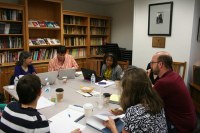
- Priscilla Wald, Sean Goudie, and Adrienne Brown (L-R) workshop ideas and introductions with other participants in 2013's inaugural FBI
Brown explains that her cohort and the FBI community helped to change her book manuscript almost entirely from its initial life as her dissertation. “When I arrived at the First Book Institute,” she relates, “I was in the middle of contemplating whether the book was going to be completely devoted to questions of racial perception. The dissertation had been much more about novelistic form more broadly but I had a hunch there was a different and more important story underlying those readings.” Through the weeklong process of workshopping, mentoring, writing, and revising, she not only discovered what that argument was, she also gained the confidence to make the change and, as she puts it, “overhaul just about everything after that point–-from the title to the chapter organization to the main claim.” In the end, Brown’s choices, which may have seemed risky at first, paid off. The MSA’s prize citation hails The Black Skyscraper’s pathbreaking achievement for the ways in which it “marries rich archival and historical research with close readings of literary texts, revealing how the skyscraper’s scale, and the shadows it cast, produced crucial – and until now overlooked – racial dimensions of American modernism.”
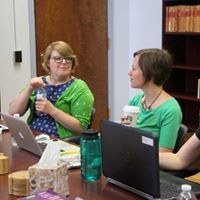
- Jillian Sayre and Carrie Hyde in discussion in 2014
Hyde also found herself reframing and rethinking her project during and after her FBI week. “I had written a new introduction and done a lot of new research and writing, but I hadn’t yet fully left behind the argumentative infrastructure of my dissertation,” she explains. In an experience that mirrors Brown’s, Hyde too found herself inspired to make changes. “The intellectual community and generous collegiality of the Institute left me newly energized and excited to expand and reimagine my research on citizenship. So, when I left the First Book Institute I also left my argumentative framing behind.” The result was an extensive process of revision that allowed her to rethink the way that citizenship has been imagined in literary and other cultural objects both within and outside of her own area of specialization, the long nineteenth century. Like Brown, Hyde worked to cross disciplinary boundaries, paying particular attention to the act of cultivating a new audience specifically attuned to her work, rather than trying to tailor her argument to readers who may prefer to remain in a single disciplinary home.
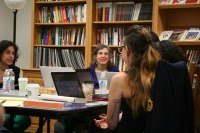
- Sonya Posmentier and Priscilla Wald during one of 2013's workshops
Sonya Posmentier echoes both Brown’s and Hyde’s experiences of the FBI and its invitation to rigorous writing and revision. While Posmentier had long been invested in the relationship between literary studies and Black Studies, her time at the First Book Institute helped her reaffirm how Cultivation and Catastrophe— which traces a rich and vibrant modern Black literary tradition responsive to a constellation of environmental and social disasters during the post-emancipation era—would intervene in and contribute to Black diasporic studies. “I think the major change was in the conceptual framework and sense of audience,” she recalls. “The workshops and conversations at FBI helped me realize that I needed to immerse myself in (rather than avoid) conversations about the status of poetry and lyric in the project.” As a scholar who was both in her first year on the tenure track and at an early point in the revision process when she participated in the Institute, Posmentier found herself drawn to workshop conversations centered on concept and form. She also appreciated that her fellow participants were at various stages in the revision process and in their professional development. Ultimately, she says, “the intellectual guidance and mutual support [made possible by and during the FBI] was the jewel of the experience.”
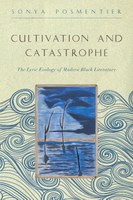 FBI co-directors Goudie and Wald recognize the importance of these support networks and think carefully when reviewing applications each spring about how each applicant might enhance the shared sense of community and purpose that makes for a successful FBI summer cohort. As Goudie puts it, “While many application letters speak eloquently about what the institute can do for them, it’s surprising how few applicants take the time to articulate what they will bring to the institute. Adrienne, Sonya, and Carrie not only brought outstanding book projects to the institute; each of them stood out in their cohorts for how supportive and insightful they were in treating the work of their peers during workshops.” Wald agrees, particularly in her consideration of what she refers to as “the intensity of the community spirit” that each installment of the FBI elicits: “We have been delighted by the spirit participants bring to the workshop,” she enthuses. “Everyone has been truly dedicated to helping their colleagues fully realize the potential of their projects and figure out the most efficient way to approach them.” The week is challenging on intellectual, personal, and physical levels, directors and participants alike affirm, but the energy and dedication can lead to outstanding results: Wald calls all three award-winning monographs “stunning,” while Goudie praises each writer not only for their contributions to their scholarly fields, but also for their shared sense of passion for their subjects, as well as their willingness to share that passion with others.
FBI co-directors Goudie and Wald recognize the importance of these support networks and think carefully when reviewing applications each spring about how each applicant might enhance the shared sense of community and purpose that makes for a successful FBI summer cohort. As Goudie puts it, “While many application letters speak eloquently about what the institute can do for them, it’s surprising how few applicants take the time to articulate what they will bring to the institute. Adrienne, Sonya, and Carrie not only brought outstanding book projects to the institute; each of them stood out in their cohorts for how supportive and insightful they were in treating the work of their peers during workshops.” Wald agrees, particularly in her consideration of what she refers to as “the intensity of the community spirit” that each installment of the FBI elicits: “We have been delighted by the spirit participants bring to the workshop,” she enthuses. “Everyone has been truly dedicated to helping their colleagues fully realize the potential of their projects and figure out the most efficient way to approach them.” The week is challenging on intellectual, personal, and physical levels, directors and participants alike affirm, but the energy and dedication can lead to outstanding results: Wald calls all three award-winning monographs “stunning,” while Goudie praises each writer not only for their contributions to their scholarly fields, but also for their shared sense of passion for their subjects, as well as their willingness to share that passion with others.
Each of this year’s awardees understand themselves to be part of groups whose work registers on scales from the intimate and local to the expansive and global. Posmentier finds that receiving the William Sanders Scarborough Prize—awarded annually “to an outstanding scholarly study of black American literature”—marks her place as a standout scholar in the thriving intersection between literary studies and Black Studies. “This [award] matters to me because I’ve always been interested in what the study of literature, in particular, means for Black Studies, and how Black Studies has shaped literary studies...So it is notable that so many scholars from the field of Black Studies were honored by the Modern Language Association this year—Hortense Spillers and Valerie Lee both won lifetime achievement awards, my co-winner for the Scarborough award was C. Riley Snorton, and there were several other honorees writing in allied fields,” she recalls. For Hyde and Brown, the notion of 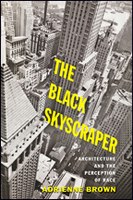 community registers on more familiar levels. “The immersive isolation of writing has its pleasures,” Hyde concedes, “but it has its real limits too….So, when I left the First Book Institute, I decided to start a small writing group in Los Angeles. I realized that some of the things I enjoyed most about the First Book Institute did not need to end when the workshops came to a close.” Brown, likewise, formed a small ad hoc writing group post-Institute in order to solicit feedback from colleagues on the revised introduction to her monograph and in doing so followed a format that closely mirrored that employed each year by Goudie, Wald, and the Institute’s participants. As she puts it, “Writing a book can feel solitary so it’s important to be in the world with and supportive to and supported by other people who are doing it for the first time or have done it and believe it can be done!” For these cohorts of early career Americanists, CALS and the First Book Institute are the spaces that make those possibilities visible, and the reality of publishing—and even further success, as demonstrated by the impressive honors garnered by Brown, Hyde, and Posmentier—attainable.
community registers on more familiar levels. “The immersive isolation of writing has its pleasures,” Hyde concedes, “but it has its real limits too….So, when I left the First Book Institute, I decided to start a small writing group in Los Angeles. I realized that some of the things I enjoyed most about the First Book Institute did not need to end when the workshops came to a close.” Brown, likewise, formed a small ad hoc writing group post-Institute in order to solicit feedback from colleagues on the revised introduction to her monograph and in doing so followed a format that closely mirrored that employed each year by Goudie, Wald, and the Institute’s participants. As she puts it, “Writing a book can feel solitary so it’s important to be in the world with and supportive to and supported by other people who are doing it for the first time or have done it and believe it can be done!” For these cohorts of early career Americanists, CALS and the First Book Institute are the spaces that make those possibilities visible, and the reality of publishing—and even further success, as demonstrated by the impressive honors garnered by Brown, Hyde, and Posmentier—attainable.
Miriam Gonzales is the 2018-19 CALS Graduate Research Assistant. She thanks Adrienne Brown, Carrie Hyde, Sonya Posmentier, and Priscilla Wald for their generous responses to her questions, and especially Sean Goudie for his responses and keen editorial guidance.

For many people, writing—whether an essay, a poem, a book, or an email—can be challenging even under ideal conditions. But writing a first scholarly monograph while simultaneously learning about and dealing with the demands of a new professional position (whether tenure track, administrative, postdoctoral, or contingent) and also working to meet the teaching and service requirements of those positions can feel overwhelming on the best of days. However, the Center for American Literary Studies’s First Book Institute, under the direction of Professors Sean X. Goudie and Priscilla Wald, has strived to make writing under those conditions feel less like a solitary enterprise and more like a vital and communal practice. Since its inception in 2013, the First Book Institute has gathered junior Americanist faculty on Penn State University’s University Park campus for one week each summer to read, write, and workshop in what participants and directors alike describe as a collegial and encouraging environment. “When we started the institute,” Goudie explains, “Priscilla and I wanted to create a space where early career scholars could go to transform their first book projects into the best work possible.” And according to Wald, it is the supportive atmosphere that matters both during the institute and in the months and years that follow: “We have found,” she reveals, “that participants often form support communities that continue past the week of the workshops….Many scholars work in places where they don’t have colleagues in their fields...and it is invaluable to have trusted interlocutors, so we are delighted to see such groups forming out of the [Institute’s] workshops each year.”

- 2014 First Book Institute participants and Sean Goudie, at the head of the table, during one of the week's opening workshops
While CALS and the First Book Institute have been proud to foster supportive writing communities—to date, past participants have produced ten monographs, with several more in press or forthcoming—2018 brought extra cause for celebration. In December, three past participants were honored with awards recognizing the impact and achievement of their books. The three award winners—Adrienne Brown, Associate Professor of English at the University of Chicago, whose The Black Skyscraper: Architecture and the Perception of Race (Johns Hopkins UP, 2017) won the Modernist Studies Association’s First Book Prize; Sonya Posmentier, Associate Professor of English at New York University, named co-winner of the MLA’s William Sanders Scarborough Prize for Cultivation and Catastrophe: The Lyric Ecology of Modern Black Literature (Johns Hopkins UP, 2017); and Carrie Hyde, Associate Professor of English at the  University of California, Los Angeles, recipient of the Gustave O. Arlt Award in the Humanities from the Council of Graduate Schools for Civic Longing: The Speculative Origins of U.S. Citizenship (Harvard UP, 2018)—represent three distinct academic institutions and sets of scholarly commitments, yet it’s clear from their reactions to these honors that the community that forms during each Institute was an important part of each scholar’s writing process. “The most valuable thing about the FBI,” remembers Posmentier, “was that we read each other’s work carefully and talked specifically about the ideas, histories, forms, and theories about which we were writing.” Becoming deeply informed about and by each other’s work means that each cohort forms a group of “border intellectuals,” or scholars whose work crosses disciplinary boundaries, a location that Hyde drew inspiration from when revising her project. It’s also an interdisciplinary vantage point that the Arlt Award in the Humanities citation explicitly recognized, commending Civic Longings for its “invaluable contribution to understanding the history of U.S. citizenship and its complexities” by “succeeding in reaching readers in multiple fields of humanistic thought.”
University of California, Los Angeles, recipient of the Gustave O. Arlt Award in the Humanities from the Council of Graduate Schools for Civic Longing: The Speculative Origins of U.S. Citizenship (Harvard UP, 2018)—represent three distinct academic institutions and sets of scholarly commitments, yet it’s clear from their reactions to these honors that the community that forms during each Institute was an important part of each scholar’s writing process. “The most valuable thing about the FBI,” remembers Posmentier, “was that we read each other’s work carefully and talked specifically about the ideas, histories, forms, and theories about which we were writing.” Becoming deeply informed about and by each other’s work means that each cohort forms a group of “border intellectuals,” or scholars whose work crosses disciplinary boundaries, a location that Hyde drew inspiration from when revising her project. It’s also an interdisciplinary vantage point that the Arlt Award in the Humanities citation explicitly recognized, commending Civic Longings for its “invaluable contribution to understanding the history of U.S. citizenship and its complexities” by “succeeding in reaching readers in multiple fields of humanistic thought.”

- Priscilla Wald, Sean Goudie, and Adrienne Brown (L-R) workshop ideas and introductions with other participants in 2013's inaugural FBI
Brown explains that her cohort and the FBI community helped to change her book manuscript almost entirely from its initial life as her dissertation. “When I arrived at the First Book Institute,” she relates, “I was in the middle of contemplating whether the book was going to be completely devoted to questions of racial perception. The dissertation had been much more about novelistic form more broadly but I had a hunch there was a different and more important story underlying those readings.” Through the weeklong process of workshopping, mentoring, writing, and revising, she not only discovered what that argument was, she also gained the confidence to make the change and, as she puts it, “overhaul just about everything after that point–-from the title to the chapter organization to the main claim.” In the end, Brown’s choices, which may have seemed risky at first, paid off. The MSA’s prize citation hails The Black Skyscraper’s pathbreaking achievement for the ways in which it “marries rich archival and historical research with close readings of literary texts, revealing how the skyscraper’s scale, and the shadows it cast, produced crucial – and until now overlooked – racial dimensions of American modernism.”

- Jillian Sayre and Carrie Hyde in discussion in 2014
Hyde also found herself reframing and rethinking her project during and after her FBI week. “I had written a new introduction and done a lot of new research and writing, but I hadn’t yet fully left behind the argumentative infrastructure of my dissertation,” she explains. In an experience that mirrors Brown’s, Hyde too found herself inspired to make changes. “The intellectual community and generous collegiality of the Institute left me newly energized and excited to expand and reimagine my research on citizenship. So, when I left the First Book Institute I also left my argumentative framing behind.” The result was an extensive process of revision that allowed her to rethink the way that citizenship has been imagined in literary and other cultural objects both within and outside of her own area of specialization, the long nineteenth century. Like Brown, Hyde worked to cross disciplinary boundaries, paying particular attention to the act of cultivating a new audience specifically attuned to her work, rather than trying to tailor her argument to readers who may prefer to remain in a single disciplinary home.

- Sonya Posmentier and Priscilla Wald during one of 2013's workshops
Sonya Posmentier echoes both Brown’s and Hyde’s experiences of the FBI and its invitation to rigorous writing and revision. While Posmentier had long been invested in the relationship between literary studies and Black Studies, her time at the First Book Institute helped her reaffirm how Cultivation and Catastrophe— which traces a rich and vibrant modern Black literary tradition responsive to a constellation of environmental and social disasters during the post-emancipation era—would intervene in and contribute to Black diasporic studies. “I think the major change was in the conceptual framework and sense of audience,” she recalls. “The workshops and conversations at FBI helped me realize that I needed to immerse myself in (rather than avoid) conversations about the status of poetry and lyric in the project.” As a scholar who was both in her first year on the tenure track and at an early point in the revision process when she participated in the Institute, Posmentier found herself drawn to workshop conversations centered on concept and form. She also appreciated that her fellow participants were at various stages in the revision process and in their professional development. Ultimately, she says, “the intellectual guidance and mutual support [made possible by and during the FBI] was the jewel of the experience.”
 FBI co-directors Goudie and Wald recognize the importance of these support networks and think carefully when reviewing applications each spring about how each applicant might enhance the shared sense of community and purpose that makes for a successful FBI summer cohort. As Goudie puts it, “While many application letters speak eloquently about what the institute can do for them, it’s surprising how few applicants take the time to articulate what they will bring to the institute. Adrienne, Sonya, and Carrie not only brought outstanding book projects to the institute; each of them stood out in their cohorts for how supportive and insightful they were in treating the work of their peers during workshops.” Wald agrees, particularly in her consideration of what she refers to as “the intensity of the community spirit” that each installment of the FBI elicits: “We have been delighted by the spirit participants bring to the workshop,” she enthuses. “Everyone has been truly dedicated to helping their colleagues fully realize the potential of their projects and figure out the most efficient way to approach them.” The week is challenging on intellectual, personal, and physical levels, directors and participants alike affirm, but the energy and dedication can lead to outstanding results: Wald calls all three award-winning monographs “stunning,” while Goudie praises each writer not only for their contributions to their scholarly fields, but also for their shared sense of passion for their subjects, as well as their willingness to share that passion with others.
FBI co-directors Goudie and Wald recognize the importance of these support networks and think carefully when reviewing applications each spring about how each applicant might enhance the shared sense of community and purpose that makes for a successful FBI summer cohort. As Goudie puts it, “While many application letters speak eloquently about what the institute can do for them, it’s surprising how few applicants take the time to articulate what they will bring to the institute. Adrienne, Sonya, and Carrie not only brought outstanding book projects to the institute; each of them stood out in their cohorts for how supportive and insightful they were in treating the work of their peers during workshops.” Wald agrees, particularly in her consideration of what she refers to as “the intensity of the community spirit” that each installment of the FBI elicits: “We have been delighted by the spirit participants bring to the workshop,” she enthuses. “Everyone has been truly dedicated to helping their colleagues fully realize the potential of their projects and figure out the most efficient way to approach them.” The week is challenging on intellectual, personal, and physical levels, directors and participants alike affirm, but the energy and dedication can lead to outstanding results: Wald calls all three award-winning monographs “stunning,” while Goudie praises each writer not only for their contributions to their scholarly fields, but also for their shared sense of passion for their subjects, as well as their willingness to share that passion with others.
Each of this year’s awardees understand themselves to be part of groups whose work registers on scales from the intimate and local to the expansive and global. Posmentier finds that receiving the William Sanders Scarborough Prize—awarded annually “to an outstanding scholarly study of black American literature”—marks her place as a standout scholar in the thriving intersection between literary studies and Black Studies. “This [award] matters to me because I’ve always been interested in what the study of literature, in particular, means for Black Studies, and how Black Studies has shaped literary studies...So it is notable that so many scholars from the field of Black Studies were honored by the Modern Language Association this year—Hortense Spillers and Valerie Lee both won lifetime achievement awards, my co-winner for the Scarborough award was C. Riley Snorton, and there were several other honorees writing in allied fields,” she recalls. For Hyde and Brown, the notion of  community registers on more familiar levels. “The immersive isolation of writing has its pleasures,” Hyde concedes, “but it has its real limits too….So, when I left the First Book Institute, I decided to start a small writing group in Los Angeles. I realized that some of the things I enjoyed most about the First Book Institute did not need to end when the workshops came to a close.” Brown, likewise, formed a small ad hoc writing group post-Institute in order to solicit feedback from colleagues on the revised introduction to her monograph and in doing so followed a format that closely mirrored that employed each year by Goudie, Wald, and the Institute’s participants. As she puts it, “Writing a book can feel solitary so it’s important to be in the world with and supportive to and supported by other people who are doing it for the first time or have done it and believe it can be done!” For these cohorts of early career Americanists, CALS and the First Book Institute are the spaces that make those possibilities visible, and the reality of publishing—and even further success, as demonstrated by the impressive honors garnered by Brown, Hyde, and Posmentier—attainable.
community registers on more familiar levels. “The immersive isolation of writing has its pleasures,” Hyde concedes, “but it has its real limits too….So, when I left the First Book Institute, I decided to start a small writing group in Los Angeles. I realized that some of the things I enjoyed most about the First Book Institute did not need to end when the workshops came to a close.” Brown, likewise, formed a small ad hoc writing group post-Institute in order to solicit feedback from colleagues on the revised introduction to her monograph and in doing so followed a format that closely mirrored that employed each year by Goudie, Wald, and the Institute’s participants. As she puts it, “Writing a book can feel solitary so it’s important to be in the world with and supportive to and supported by other people who are doing it for the first time or have done it and believe it can be done!” For these cohorts of early career Americanists, CALS and the First Book Institute are the spaces that make those possibilities visible, and the reality of publishing—and even further success, as demonstrated by the impressive honors garnered by Brown, Hyde, and Posmentier—attainable.
Miriam Gonzales is the 2018-19 CALS Graduate Research Assistant. She thanks Adrienne Brown, Carrie Hyde, Sonya Posmentier, and Priscilla Wald for their generous responses to her questions, and especially Sean Goudie for his responses and keen editorial guidance.